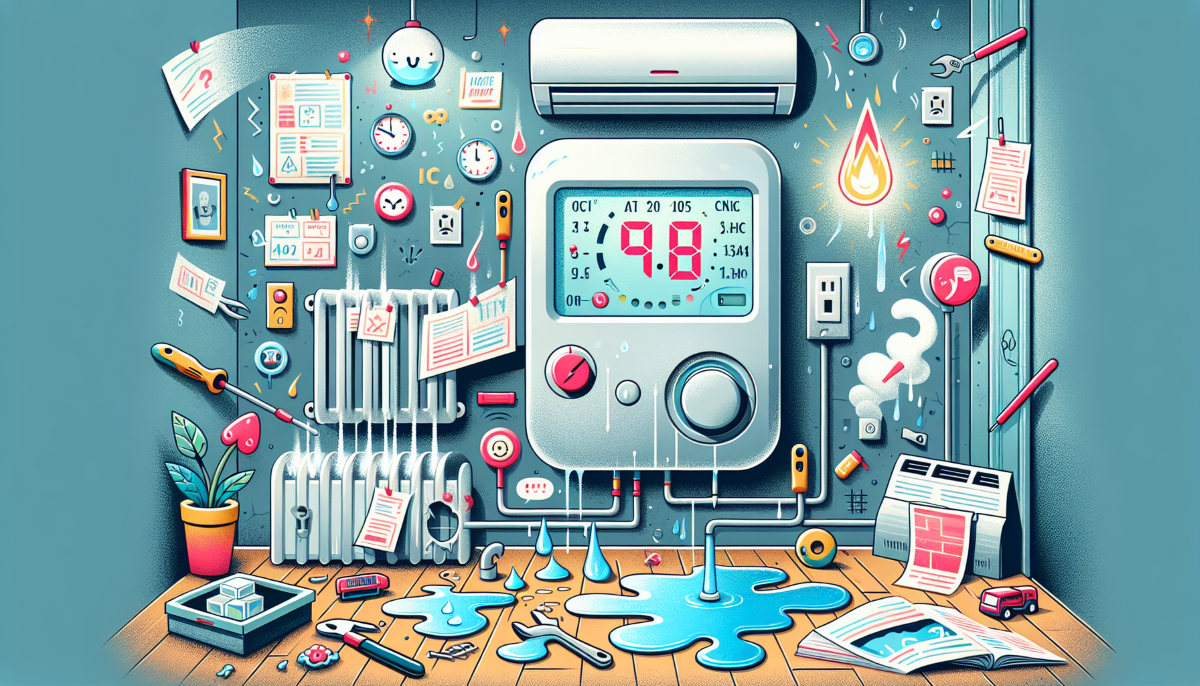Best Heater and Air Conditioner Repair Services Explained
Is your heater or air conditioner not working? This heater and air conditioner repair guide will help you troubleshoot common issues, decide if you need professional help, and understand repair costs and maintenance.
Key Takeaways
Understanding the components of your HVAC system is crucial for maintaining indoor comfort and efficiency.
Common HVAC issues such as poor airflow and refrigerant leaks require prompt attention to avoid escalation.
Regular maintenance and timely professional repairs can significantly extend the lifespan of HVAC systems and reduce overall energy costs.
Understanding Your HVAC System
Your HVAC system is a complex network that regulates indoor temperature and air quality, including heating and air conditioning. It typically includes:
Heat pumps
Furnaces
Boilers
Each component helps keep your home comfortable throughout the year.
Air handlers are essential for circulating conditioned air and include critical components like:
The blower
The evaporator coil, which absorbs indoor heat, allowing refrigerant to evaporate and cool the air that is then recirculated back indoors
The condenser coil, found in the outdoor unit, which releases heat absorbed from indoors to the outdoor environment
Ductwork transports conditioned air throughout your home and requires regular inspections for leaks to maintain efficiency. The thermostat acts as the control center, managing the operation of the HVAC system based on your settings. Each component is designed to work in harmony, ensuring reliable heating and cooling.
Common Heater and Air Conditioner Problems
Even the most robust HVAC systems can encounter issues. Common problems include poor airflow, strange noises, leaks, and inconsistent temperatures. These issues can disrupt your comfort and signal underlying problems that need attention.
Cooling failures often arise from issues with key components like the condenser, evaporator, and thermostat. Electrical control failures may occur due to the air conditioning unit's frequent cycling, indicating wear on the controls. Misaligned thermostat sensors can cause erratic operation, affecting the unit’s performance.
Refrigerant leaks can severely impact the unit’s cooling ability. It’s also essential to ensure the thermostat is correctly placed, as its location can affect the overall performance of the HVAC system. Regular inspections and prompt repairs can prevent these problems from escalating.
DIY Troubleshooting Tips
Before calling a professional, there are several troubleshooting steps you can take. First, ensure your thermostat is set to cooling mode instead of heating. If your AC isn’t starting, check and reset any tripped circuit breakers, as this is a common issue. Checking the breaker panel or fuse is crucial, as a blown fuse can prevent the unit from operating.
Additionally, closed air vents can increase pressure in the ducts, causing damage to the system. Could you make sure all vents are open and unobstructed? If you notice ice buildup on the air conditioning unit, simply turning off the system to allow the ice to melt can often resolve the problem.
These simple steps can save you time and avoid unnecessary service calls.
When to Call a Professional
Certain HVAC issues require the expertise of a professional. Electrical problems, such as burning smells or visible sparks, demand immediate attention from a qualified electrician. Refrigerant leaks pose health risks and should be addressed by a professional due to their hazardous nature.
If your air conditioner stops working during extreme weather, it’s considered an emergency and requires prompt professional assistance. Unusual or loud sounds from the HVAC system often signal internal damage and should prompt a call to a technician. Additionally, if specific rooms in your home are not cooling properly, it could indicate issues like clogged ducts or refrigerant leaks, necessitating expert assessment.
Water leaks from the AC unit can indicate a clogged drain line and should be addressed immediately. If a new fuse blows again after replacement, call a professional. Ensuring your technician has the necessary licenses and certifications can help guarantee quality service.
The Repair Process
The repair process begins with a thorough checkup by an HVAC service provider. They will diagnose the issues and perform necessary maintenance, including air conditioner repair service, to ensure the unit functions properly. They may check for rodents’ nests or chewed wires inside the access panel during the inspection.
Common repairs include replacing capacitors and AC contactors. Capacitors store electricity and provide extra power during startup, while AC contactors are mechanical relays that switch high-voltage currents. These components should be replaced approximately every five years to maintain optimal performance.
If broken wires are found inside the access panel, the first step is to discharge the capacitor to repair the wires and clean out any nests safely. Consider buying and installing replacement parts like contactors and capacitors for older units to extend the system’s life. Deciding between repairing or replacing parts often depends on the unit’s age and the severity of the issue.
Preventative Maintenance Tips
Regular HVAC maintenance is crucial for preventing costly repairs and extending the life of your air conditioning system. Consistent service improves indoor air quality by minimizing pollutants and allergens. Key maintenance tasks include cleaning the condenser coils, replacing dirty air filters, and ensuring clean air ducts.
Scheduling HVAC service at least once a year can help detect minor issues before they become major problems. Annual maintenance keeps systems running efficiently and prevents your air conditioning service from working overtime, which can lead to decreased efficiency and premature failure.
Finding Reliable HVAC Technicians
Finding reliable HVAC technicians is essential for quality service. Reading reviews can help you avoid scams and ensure you hire trustworthy contractors. To protect yourself from liability, follow up on the background of the HVAC service company and inquire about insurance and bonding.
Many HVAC technicians offer free estimates, allowing homeowners to compare prices before hiring. Establishing a routine with an HVAC contractor fosters familiarity, enhances service quality, and ensures your system is well-maintained.
Cost of Heater and Air Conditioner Repairs
The cost of heater and air conditioner repairs can vary widely. In 2023, the average cost for HVAC repairs ranged from $150 to $600. Repairing a central air conditioning system may cost as much as $2,800 while fixing a window air conditioning unit typically costs around $100. Additionally, air conditioning repairs can also contribute to overall maintenance costs.
Repairing a heat pump can range between $250 and $1,000, and furnace repairs can vary from $100 to $1,500. Factors affecting costs include the unit type and the issue’s severity, with technician appointments typically costing a few hundred dollars. A unit that requires fresh refrigerant is expected to cost between $160 and $400. This range reflects the typical expenses associated with such a service.
Benefits of Regular HVAC Service
Regular HVAC maintenance can significantly reduce energy costs by enhancing system efficiency. It can also extend the lifespan of HVAC systems, often beyond the average 10-15 years, preventing premature replacements.
A well-maintained HVAC system significantly reduces the likelihood of unexpected failures, contributing to a comfortable working environment and positively impacting productivity. Professional HVAC services suggest scheduling maintenance at least twice yearly, ideally in spring and fall.
Summary
Understanding your HVAC system and its common problems can save you time and money. Regular maintenance and timely professional repairs ensure your system runs efficiently and lasts longer. Following the tips and guidelines, you can maintain a comfortable and healthy indoor environment year-round.
Remember, a well-maintained HVAC system enhances comfort, contributes to energy savings, and improves air quality. Prioritize regular maintenance, and don’t hesitate to call in professionals when needed. Your comfort and peace of mind are worth the investment.
Frequently Asked Questions
What are the most common HVAC problems?
Poor airflow, strange noises, leaks, and inconsistent temperatures are the most common HVAC problems. Addressing these issues promptly can help maintain system efficiency and comfort.
When should I call a professional for HVAC issues?
You should call a professional for HVAC issues such as electrical problems, refrigerant leaks, non-functional units in extreme weather, unusual noises, or if your system is not cooling evenly. I'd appreciate your addressing these concerns quickly to ensure your system operates efficiently and safely.
How often should I schedule HVAC maintenance?
To ensure optimal performance and efficiency, schedule HVAC maintenance at least once a year, ideally twice a year during the spring and fall. Regular maintenance helps to prevent issues and extend the lifespan of your system.
What are the costs associated with HVAC repairs?
HVAC repair costs typically range from $150 to $2,800, influenced by the unit type and the complexity of the problem. It's essential to assess the specific issue to determine the most accurate estimate.
How can I find a reliable HVAC technician?
To find a reliable HVAC technician, check online reviews, verify the company's credentials, ensure they have proper insurance and bonding, and look for those offering free estimates. These steps will help ensure you choose a qualified professional.





